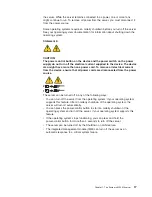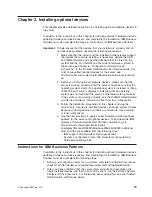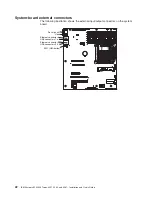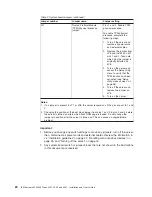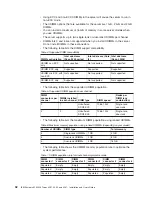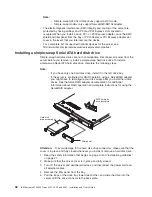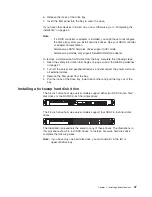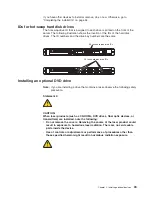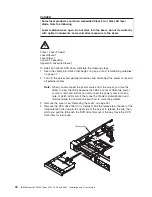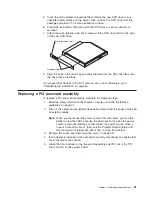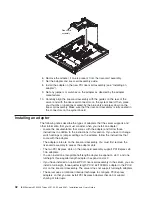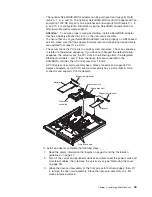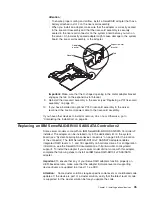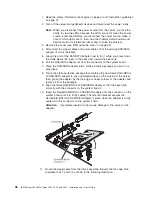
v
You can use compatible DIMMs from various manufacturers in the same pair.
v
When you install or remove DIMMs, the server configuration information
changes. When you restart the server, the system displays a message that
indicates that the memory configuration has changed.
v
The specifications of a DDR3 DIMM are on a label on the DIMM, in the following
format.
ggg e
Rx
ff
-PC3-
wwwwwm
-
aa
-
bb
-
cc
where:
ggg
is the total capacity of the DIMM (for example, 1GB, 2GB, or 4GB)
e
is the number of ranks
1 = single-rank
2 = dual-rank
4 = quad-rank
ff
is the device organization (bit width)
4 = x4 organization (4 DQ lines per SDRAM)
8 = x8 organization
16 = x16 organization
wwwww
is the DIMM bandwidth, in MBps
8500 = 8.53 GBps (PC3-1066 SDRAMs, 8-byte primary data bus)
10600 = 10.66 GBps (PC3-1333 SDRAMs, 8-byte primary data bus)
m
is the DIMM type
E = Unbuffered DIMM (UDIMM) with ECC (x72-bit module data bus)
R = Registered DIMM (RDIMM)
U = Unbuffered DIMM with no ECC (x64-bit primary data bus)
aa
is the CAS latency, in clocks at maximum operating frequency
bb
is the JEDEC SPD Revision Encoding and Additions level
cc
is the reference design file for the design of the DIMM
Notes:
1. To determine the type of a DIMM, see the label on the DIMM. The
information on the label is in the format xxxxx nRxxx PC3-xxxxx-xx-xx-xxx.
The numeral in the sixth numerical position indicates whether the DIMM is
single-rank (n=1), dual-rank (n=2), or quad-rank (n=4).
2. The amount of usable memory is reduced, depending on the system
configuration. A certain amount of memory must be reserved for system
resources. To view the total amount of installed memory and the amount of
configured memory, run the Setup utility. For additional information, see
Chapter 3, “Configuring the server,” on page 57.
The following sections provide additional information specific to unbuffered and
registered DIMMs that you must consider.
Unbuffered DIMMs (UDIMMs)
The following notes provide information that you must consider when you install
UDIMMs:
v
The memory channels run at the fastest common frequency of the DIMMs
installed.
v
Do not use both UDIMMs and RDIMMs in the same server.
Chapter 2. Installing optional devices
31
Summary of Contents for 4251
Page 1: ...IBM System x3250 M3 Types 4251 4252 and 4261 Installation and User s Guide ...
Page 2: ......
Page 3: ...IBM System x3250 M3 Types 4251 4252 and 4261 Installation and User s Guide ...
Page 7: ...Index 85 Contents v ...
Page 8: ...vi IBM System x3250 M3 Types 4251 4252 and 4261 Installation and User s Guide ...
Page 34: ...18 IBM System x3250 M3 Types 4251 4252 and 4261 Installation and User s Guide ...
Page 100: ...84 IBM System x3250 M3 Types 4251 4252 and 4261 Installation and User s Guide ...
Page 105: ......
Page 106: ... Part Number 81Y6118 Printed in USA 1P P N 81Y6118 ...

